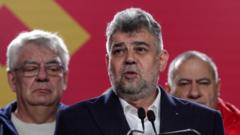In a significant political transition, Friedrich Merz, leader of the conservative Christian Democratic Union, will be sworn in as Germany's new chancellor, succeeding Olaf Scholz amid mounting economic pressures.
Germany's Political Landscape Shifts with the New Chancellor

Germany's Political Landscape Shifts with the New Chancellor
Friedrich Merz Takes Office Amid Economic Challenges and Strategic Risks
In a pivotal shift for German politics, Friedrich Merz is set to take the oath of office as the new chancellor on Tuesday, six months after the collapse of Olaf Scholz’s three-party coalition government. The leadership transition comes after a swift negotiation process that saw the Christian Democratic Union (C.D.U.) secure a leading 28.5 percent of the electoral vote, outpacing the Social Democrats (S.P.D.), who trailed behind at 16.5 percent.
Merz, aged 69 and an accomplished orator, aims to reinstate Germany’s pivotal role in European leadership. His political career has witnessed a decade-long hiatus, primarily due to being overshadowed by Angela Merkel's tenure, and he does not possess any previous ministerial experience.
Despite this fresh start, the Merz government faces significant challenges. Germany is experiencing one of its most precarious periods since the reunification of East and West in 1990. Economic clouds are looming as sluggish growth persists, exacerbated by global issues such as rising energy costs run up from sanctions on Russian gas and a decline in demand from China for German exports, especially luxury vehicles.
Security concerns are also at the forefront, with the potential erosion of American military guarantees since the escalation of the conflict in Ukraine, which previously allowed Germany to underinvest in defense.
As Merz prepares to navigate these tumultuous waters, his leadership will be closely scrutinized as the nation grapples with both internal and external pressures that could redefine its standing in Europe and the global arena.



















